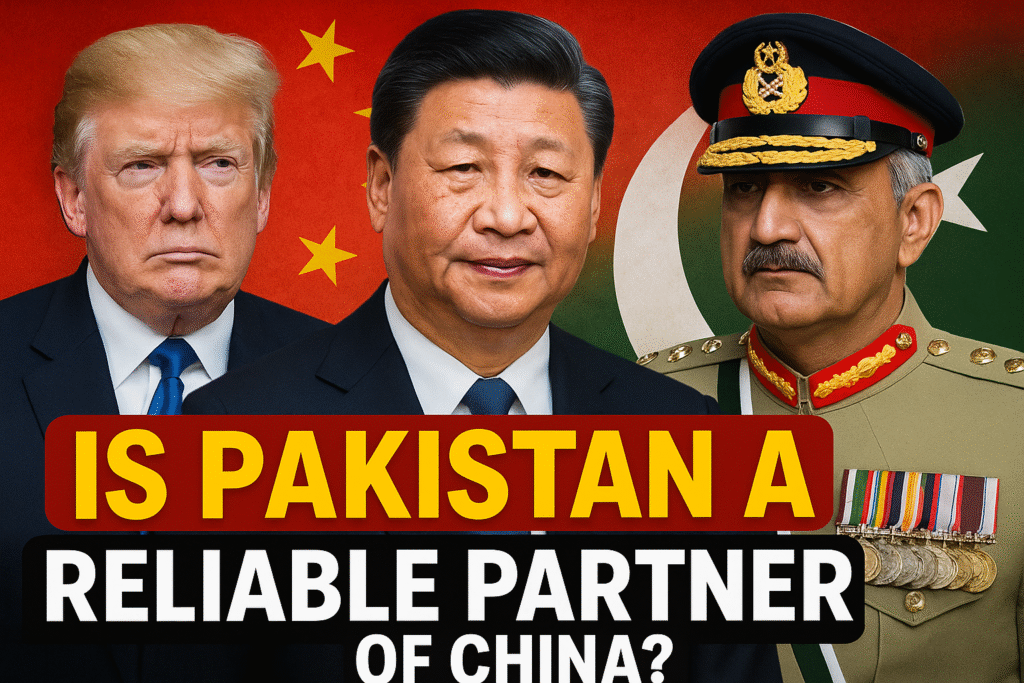As global power dynamics shift rapidly, one question has become more urgent than ever: Is Pakistan a reliable partner of China? While China and Pakistan have long described their relationship as an “iron brotherhood,” the increasing influence of the United States in Pakistan’s internal and military affairs raises serious doubts about the depth of that loyalty. The recent Iran-Israel conflict has shown how fragile alliances can be when external powers pull the strings behind the scenes. For China, this may be the right time to reassess whether Pakistan truly serves its strategic interests—or if Washington’s hidden hand could eventually undermine Beijing’s goals in the region. This article explores the geopolitical realities, strategic risks, and critical lessons China must consider in light of recent global events.
Pakistan a Reliable Partner of China – The Illusion of an ‘Iron Brotherhood’

China and Pakistan have historically enjoyed strong diplomatic, military, and economic ties. From the China-Pakistan Economic Corridor (CPEC) to defense cooperation and joint military exercises, both nations have consistently projected unity against common strategic concerns, particularly regarding India and U.S. dominance in the region
However, behind the facade of this “iron brotherhood” lies a more complicated reality. Pakistan’s military establishment has long-standing links with the United States, dating back to the Cold War and reinforced during the post-9/11 era. Billions of dollars in U.S. aid, military training, and intelligence-sharing have entrenched American influence in Pakistan’s decision-making processes—often placing Islamabad in a difficult balancing act between Beijing and Washington.
In future, China is planning to give its J-35A stealth fighter jets Advance Technology to Pakistan at a very low price
U.S. Influence Over Pakistan: A Strategic Threat to China?
Is USA-Controlled Pakistan a Reliable Partner of China?
While Pakistan continues to publicly align with China on many international issues, it has never fully severed its ties with the United States. In fact, U.S. pressure has been visible in key decisions taken by Pakistani leadership, especially in times of diplomatic crisis or financial distress.
For example:
- IMF bailouts—often backed by the U.S.—have come with strings attached, influencing Pakistan’s internal policies.
- Security cooperation with the U.S. persists despite increased Chinese investment.
- Geopolitical ambiguity—Pakistan has avoided strongly backing China on sensitive issues like Xinjiang or Taiwan in international forums.
These actions suggest that Pakistan’s loyalties may shift when strategic or economic pressure is applied, making it a less-than-reliable partner for China in high-stakes geopolitical competition.
Why China should not trust Pakistan
Is USA-Controlled Pakistan a Reliable Partner of China?
1. Afghan War (1978–1992): Soviet Invasion of Afghanistan and Pakistan’s Strategic Role
The Afghan War (1978–1992), especially the Soviet invasion of Afghanistan (1979–1989), was one of the defining Cold War conflicts that reshaped geopolitics in South and Central Asia. The war saw the USSR attempting to prop up a communist government in Kabul, while the United States, along with regional allies like Pakistan, backed the Islamic Mujahideen resistance. Pakistan’s role during this period was not only pivotal but also transformational in its regional and global positioning.
Frontline State in the U.S.-Led Proxy War
Pakistan, under military ruler General Zia-ul-Haq, became the frontline state for the U.S. and the West in their anti-Soviet strategy. With strong backing from the CIA and Saudi Arabia, Pakistan’s intelligence agency, the ISI (Inter-Services Intelligence), played a central role in organizing, training, and supplying the Afghan Mujahideen.
2. Pakistan can spy on China for USA
While China continues to supply Pakistan with advanced military technology, including drones, missiles, and stealth-capable fighter jets, concerns are quietly rising within strategic circles: Can Pakistan be trusted not to leak or share Chinese military secrets with the United States? Given Pakistan’s long-standing defense ties and intelligence cooperation with the U.S., the possibility of covert espionage or backchannel information-sharing cannot be ruled out. The Pakistani military, especially the Inter-Services Intelligence (ISI), has deep institutional links with Western agencies dating back to the Cold War and the War on Terror. This raises a serious question—could sensitive Chinese technology, once handed over to Pakistan, end up being studied or even reverse-engineered by American defense analysts? In the high-stakes game of geopolitics, where trust is fragile and loyalties are often transactional, China must carefully weigh the risks of arming a partner who might also be serving another master.
3. Why Pakistan’s Loyalty Lies with the West, Not China: The Hidden Wealth Factor
Despite its growing military and economic ties with China, Pakistan’s true allegiance may still lie with the West—particularly the United States and the United Kingdom. A major reason is that most of the assets, bank accounts, real estate, and offshore investments of Pakistan’s top political leaders and military elite are located in the U.S. and U.K., not in China. This financial dependency creates a silent but powerful leverage for Western powers over Islamabad’s decision-making. Whether it’s a diplomatic vote at the UN or a sensitive defense collaboration, Pakistani elites are more likely to align with the interests of the nations where their wealth is secured. China, despite its technological support and financial aid, may struggle to command true loyalty from a partner whose powerful decision-makers are economically tied to the West.
4. Why Pakistan Didn’t Support Iran: Spying for the U.S. and Israel Despite Islamic Brotherhood
Despite both being Muslim-majority nations, Pakistan has consistently distanced itself from Iran during critical moments, often siding—directly or indirectly—with the strategic interests of the United States and Israel. In fact, several intelligence reports and incidents over the years suggest that Pakistani intelligence agencies have cooperated with Western powers by operating covertly within Iran, gathering sensitive information and even assisting in anti-Iranian operations. This reflects a deeper geopolitical reality where religious identity takes a back seat to strategic alignments. Pakistan’s reliance on U.S. military aid, Gulf funding, and its internal sectarian dynamics—especially its tensions with Iran over Shia influence—have all contributed to a fractured Islamic unity. Instead of supporting Iran in times of crisis, Pakistan has often played the role of a silent observer—or worse, a covert actor serving Western agendas in the region.
5. Will Pakistan Support China in a War with Taiwan? Strategic Ties vs. Western Pressure
If a war breaks out between China and Taiwan, the question of Pakistan’s stance becomes crucial. While Pakistan is officially a strategic ally of China and a beneficiary of massive Chinese investment through projects like CPEC, its support in an actual conflict is not guaranteed. Pakistan’s deep-rooted economic and military links with the United States, along with the Western control over its elite’s financial assets, could pressure Islamabad to adopt a neutral or ambiguous position. Openly siding with China could invite global sanctions or economic backlash, especially at a time when Pakistan is already facing financial instability and seeking IMF support. Therefore, while public statements may favor China’s “One China Policy,” active military or political support in a war scenario is highly uncertain, exposing the fragile nature of so-called strategic alliances in the face of global pressure.
Conclusion: Time for China to Reassess
Is USA-Controlled Pakistan a Reliable Partner of China? The world is entering a new era of geopolitical uncertainty, where traditional alliances are no longer enough. The Iran-Israel war has taught us that partnerships built on convenience or outdated loyalties can collapse under pressure. For China, blind faith in Pakistan’s reliability may be a strategic vulnerability.
As U.S. influence over Pakistan remains strong, and as regional conflicts highlight the dangers of miscalculation, China must ask the hard question: Is Pakistan a reliable partner of China—or a geopolitical trap waiting to unfold?
Is USA-Controlled Pakistan a Reliable Partner of China? – Comment and share your opinion




Nice 👍